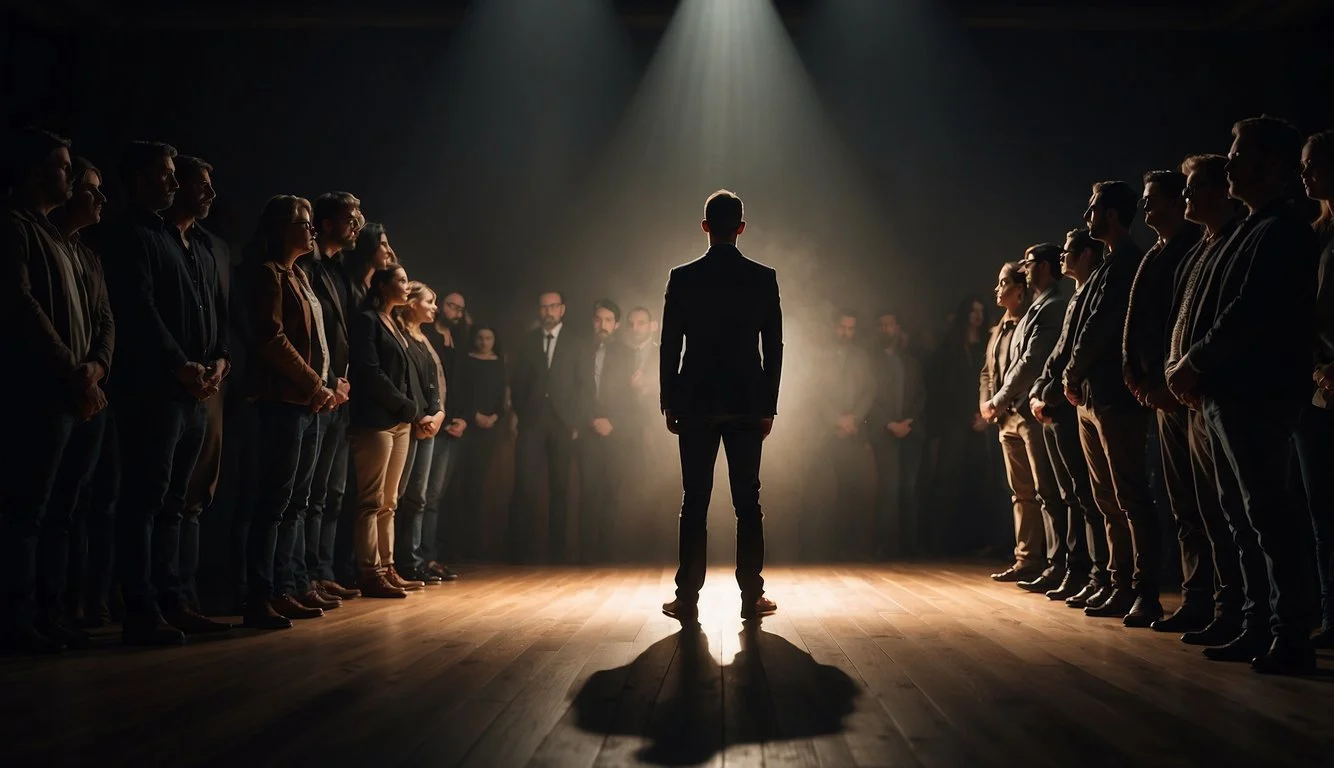Documentary Review: How to Become a Cult Leader (2023)
An In-depth Analysis
The 2023 Netflix documentary series "How to Become a Cult Leader" offers an in-depth exploration into the minds and methods of history's most infamous cult leaders. With Peter Dinklage narrating, the series promises to unravel the intricacies of how these figures amassed unconditional love, endless devotion, and unparalleled influence over their followers.
For those intrigued by true crime and psychological manipulation, this series sheds light on the playbook of cult leaders. Featuring insightful commentary and real-life examples, it dissects the strategies used to captivate and control individuals, effectively turning ordinary people into devoted followers.
By presenting a blend of satire and serious analysis, "How to Become a Cult Leader" stands out in the crowded field of true crime documentaries. It offers a unique perspective, making it a compelling watch for anyone curious about the darker aspects of human behavior and leadership.
Background Information on the Film
Released on July 28, 2023, How to Become a Cult Leader is a documentary series available on Netflix. The series delves into the methodologies and psychological strategies employed by cult leaders to gain and maintain control over their followers.
Peter Dinklage narrates the series, adding a layer of engaging storytelling. His ironic and sometimes sarcastic narration provides a unique contrast to the dark subject matter.
The series combines archive footage, animation, and expert commentary. This multimedia approach gives viewers a comprehensive understanding of the mechanisms behind cult leadership.
The show takes inspiration from and shares a stylistic resemblance with the series How to Become a Tyrant. Both series aim to break down complex behaviors into understandable segments.
The series reviews the practices of six cult leaders. It explores their rise to power and the methods they used to manipulate and dominate their followers. By doing so, it tries to answer what makes a successful cult leader.
The documentary also features insights from specialists. These include Lola Blanc, Diane Benscoter, and Janja Lalich, who provide focused commentary on specific aspects of cult dynamics.
The critical reception has been mixed. Rotten Tomatoes reports a 57% Tomatometer score based on 7 reviews and a 52% Audience Score.
Network: Netflix
Main Narrator: Peter Dinklage
This mix of interviews, animations, and historical footage offers a detailed examination of the dark art of cult leadership, focusing on psychological manipulation and control.
Synopsis of 'How to Become a Cult Leader'
How to Become a Cult Leader is a 2023 Netflix documentary series that explores the intricate tactics used by some of history's most infamous cult leaders. Narrated by Peter Dinklage, the series delves into the psychological and sociological techniques employed to recruit and control followers.
The series is structured into six episodes, each focusing on different cult leaders and their methods. Viewers are introduced to the allure of unconditional love, endless devotion, and the power to dominate minds, bodies, and souls.
The documentary features real-life stories and interviews with experts like Diane Benscoter and Janja Lalich. Through these narratives, it showcases how charismatic leaders manipulate their followers, exploiting their vulnerabilities and fostering dependence.
Historical figures such as Joseph Stalin, Saddam Hussein, and Adolf Hitler are also discussed, showing parallels between political and cult leadership. Archival footage and expert commentary provide an in-depth look into the mindsets and environments that sustain these groups.
The content balances between dark humor and educational insights, aiming to engage and inform the audience. By examining these extreme cases, the series provides a compelling look at the dynamics of power and control.
Film Production Elements
"How to Become a Cult Leader" blends insightful interviews and archival footage to dive deep into the minds of infamous cult leaders. Through careful direction, engaging cinematography, precise editing, and evocative sound design, the series holds viewers' attention every step of the way.
Directing and Vision
Director Peter Dinklage spearheads the vision for "How to Become a Cult Leader" with a clear purpose. His approach blends educational content with a darkly comedic tone, creating a captivating and unique atmosphere. By juxtaposing serious subject matter with satirical commentary, he effectively captures the viewer's interest. His direction ensures that the narrative stays focused yet engaging, maintaining an informative and balanced perspective throughout the series.
Cinematography
The cinematography in "How to Become a Cult Leader" utilizes a mix of archival footage and recreated scenes to enhance the storytelling. Each shot is deliberately composed to highlight significant moments, using close-ups for emotional impact and wide shots to provide context. This visual diversity not only draws the viewer in but also emphasizes the gravity and eccentricity of the leaders being discussed. The lighting choices often underscore the eerie and unsettling nature of the cult environments.
Editing and Pacing
Editing plays a crucial role in maintaining the series' accessibility and engagement. Swift transitions between historical clips and expert interviews keep the narrative brisk. The editors avoid long-winded segments, ensuring that the pacing remains dynamic. By balancing concise, informative segments with longer, more in-depth analyses, they create a rhythmic flow that maintains the viewer's interest. This careful editing helps clarify complex stories without overwhelming the audience.
Score and Sound Design
The score and sound design are instrumental in setting the tone for "How to Become a Cult Leader." The musical score employs a mix of ominous and suspenseful tracks that mirror the dark themes of the series. Sound design elements, such as echoing voices and eerie background noises, augment the unsettling atmosphere. These auditory components work seamlessly with the visuals to heighten the emotional and psychological impact, making each episode both haunting and compelling.
Themes and Interpretations
The documentary "How to Become a Cult Leader" explores several pivotal themes, including the dynamics within cults, the psychological traits of leaders, and the broader societal impact of cultic behavior.
Representation of Cult Dynamics
This series offers an in-depth look at the functionality and structure of cults. By examining historical and contemporary examples, viewers see how cult leaders establish control through manipulation and charisma.
Examples of cults like those led by Charles Manson and Jim Jones are highlighted to demonstrate their methods. The documentary scrutinizes tactics such as isolation, indoctrination, and the creation of a shared belief system. These elements are crucial in understanding how followers become deeply ingrained in the cult's ideology.
Psychological Analysis of Leadership
Leadership within cults is dissected to reveal a pattern of psychological traits common among cult leaders. Traits like narcissism, charm, and a proclivity for manipulation are explored in detail.
Notable figures, such as Manson and Jones, serve as case studies to better understand how these psychological characteristics play out in real-world scenarios. This section raises questions about the inherent nature of these leaders and their ability to exploit the vulnerabilities of their followers.
Implications for Society
The effects of cult behavior extend beyond individual groups to society as a whole. By detailing specific social consequences, the documentary underscores the importance of awareness and education on cultic practices.
Themes about the dangers of blind obedience and the potential for societal disruption are prevalent. Insights into prevention and the need for psychological and social interventions are discussed to mitigate the harmful impacts that cults can inflict on communities and cultures.
Performances
The performances in How to Become a Cult Leader are crucial to its narrative. Each cast member contributes significantly, and the reception reflects diverse public opinions.
Main Cast Breakdown
Peter Dinklage serves as the narrator, adding gravity with his distinctive voice. Lola Blanc and Diane Benscoter provide expert insights, enhancing the credibility of the storytelling. Their contributions delve into the psychological manipulation tactics employed by cult leaders, elevating the series’ educational value.
Critical Reception
Critics have lauded the performances, highlighting Dinklage's narration as a standout element. Reviewers appreciate the authentic portrayal of historical figures and the compelling reenactments. While some critique the series for dramatization, many agree the performances add depth, making the content more engaging and accessible.
Cultural Impact and Public Reaction
The series has sparked significant discussion on social media, with many praising the cast's performances. Public reaction underscores the effective blending of entertainment and education. This response indicates a growing interest in understanding the psychological aspects of cult leadership.
Comparative Analysis
Compared to similar series, How to Become a Cult Leader benefits immensely from Dinklage's authoritative narration. It stands out for its unique approach to presenting historical material, similar to other acclaimed documentaries but distinguished by its focus on performance quality.
Educational Value
The performances play a vital role in the series' educational impact. By delivering nuanced portrayals, the cast aids in demystifying the processes cult leaders use to manipulate followers. This approach helps viewers grasp complex psychological concepts in a more relatable manner.
Conclusion and Final Thoughts
In essence, the strong performances contribute significantly to the series' success. They not only enhance viewer engagement but also provide a richer understanding of the subject matter. The cast's dedication to their roles underscores the importance of expert storytelling in documentary filmmaking.
Supporting Cast Contributions
The series "How to Become a Cult Leader" features a notable supporting cast that enhances its depth and appeal.
Peter Dinklage lends his narration talent, providing a unique and captivating voice that guides viewers through each episode. His calm yet engaging tone adds a layer of intrigue and gravitas.
Lola Blanc offers her perspective as a former cult member, sharing personal experiences that bring authenticity to the series. Her accounts provide first-hand insights into the psychological impact of cult leadership.
Diane Benscoter joins the supporting cast as a deprogrammer. Her expertise in helping individuals leave cults translates into compelling interviews and discussions on the methods used by cult leaders to control their followers.
Janja Lalich, a sociologist and former cult member, provides analytical commentary. Her professional background allows her to dissect the tactics of cult leaders with clarity and academic precision.
The contributions of these supporting cast members add layers of complexity and understanding to the documentary. The blend of personal experiences and expert analyses creates a rich, informative viewing experience. Each member brings a unique angle, enhancing the overall narrative by providing multiple viewpoints on the topic.
The combination of these voices ensures that "How to Become a Cult Leader" is not just informative but also deeply engaging. Their contributions help paint a comprehensive picture of cult dynamics, making the series a must-watch for anyone interested in the subject.
Analysis of Interviews
In How to Become a Cult Leader, the documentary series relies on various forms of interviews to enhance its narrative.
Former Cult Members
Interviews with former cult members provide a personal and insider perspective. These accounts add depth and authenticity, allowing viewers to understand the psychological and social impacts of cult involvement.
Lack of Professional Insight
There is a notable absence of professional interviews with experts such as anthropologists, psychologists, sociologists, and theologians. This limits the documentary's ability to offer academic or scientific analysis.
Narration by Peter Dinklage
Peter Dinklage's narration ties the content together, though it leans more towards a cheeky, comedic tone. This style may not appeal to all viewers, particularly those looking for a more serious examination of cult dynamics.
Use of Re-Enactments
At least one actor, Lola Blanc, is highlighted as portraying a former cult member. This raises questions about the authenticity and reliability of some interview content.
Visual and Audio Elements
The series utilizes a mix of visual and audio elements to complement the interviews. Scenes of cult leaders and dramatizations serve as a backdrop to the narrative but may distract from more factual content.
Overall, while the personal stories from former cult members are compelling, the absence of expert analysis and reliance on dramatization could hinder a comprehensive understanding of the complex subject matter.






